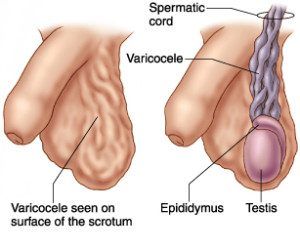introduction
If you’ve been hearing the term varicocele and wondering what it means—especially in the context of exercise or gym workouts—you’re not alone. Varicocele affect a significant number of men, yet many are unaware of the condition until it starts causing discomfort or fertility issues.
Let’s take a closer look at this common but often misunderstood health issue that can impact male reproductive health, especially in men who lead physically active lives.
What Is a Varicocele?
A varicocele is essentially an enlargement of the veins within the scrotum, similar to a varicose vein you might find in the leg. These veins are part of the spermatic cord, which holds and supports the testicles. When the valves inside these veins malfunction, blood begins to pool rather than flow smoothly, leading to swelling and discomfort.
The condition is more common than many people think. According to studies, about 15% of men have a varicocele, and it’s a leading cause of reduced sperm production and quality, which can contribute to infertility.
For an in-depth look into this topic, check out this What Is a Varicocele? Causes, Symptoms, and Treatment Options article that dives deeper into all the major aspects of this condition.
What Causes a Varicocele?
There’s no single cause of varicocele, but several factors can contribute to its development. These include:
-
Valve malfunctions in the spermatic veins, which prevent normal blood flow
-
Increased abdominal pressure, often due to heavy lifting or straining
-
Genetic predisposition, as it tends to run in families
-
Hormonal imbalances, especially those affecting testosterone regulation
Interestingly, most varicoceles occur on the left side of the scrotum. This is because the left testicular vein connects to the left renal vein at a right angle, creating more pressure compared to the right side.
Can Going to the Gym Cause Varicocele?
This is a common concern, especially for fitness enthusiasts. While hitting the gym doesn’t directly cause varicoceles, certain intense activities can worsen existing conditions or increase your risk if you’re genetically predisposed.
Here’s how gym workouts might be linked:
-
Heavy lifting: Frequent, intense weightlifting without proper form or breathing techniques can raise abdominal pressure, impacting venous blood flow.
-
Straining: Exercises that cause you to “bear down” (like squats, deadlifts) can trigger vein dilation.
-
Lack of recovery time: Overexertion and insufficient rest can aggravate symptoms.
That said, staying fit is important. You don’t need to avoid the gym entirely—just train smart, lift within your limits, and focus on form. Wearing supportive gear and staying hydrated can also make a difference.
Recognizing Varicocele Symptoms
Many men with varicocele don’t notice any symptoms at all. However, if symptoms do appear, they may include:
-
A dull ache or pain in the scrotum, especially after standing or exercising
-
A feeling of heaviness in the testicles
-
Visibly enlarged or twisted veins
-
Shrinking of the affected testicle (testicular atrophy)
-
Problems with fertility, such as difficulty conceiving
The symptoms often get worse over the course of the day and may improve when lying down, as this helps blood flow return to normal.
How Is Varicocele Diagnosed?
If you suspect a varicocele, it’s best to consult a urologist. Diagnosis typically includes:
-
Physical examination: The doctor feels the scrotum while you’re standing and may ask you to bear down (Valsalva maneuver).
-
Scrotal ultrasound: This imaging test helps confirm the diagnosis and measure the size of the veins.
-
Semen analysis: If fertility is a concern, your doctor may order this to assess sperm count, motility, and structure.
Treatment Options for Varicocele
The good news is that varicoceles are treatable, and many men go on to lead completely normal lives afterward—including returning to the gym!
Here are the main treatment paths:
1. Watchful Waiting
If the varicocele isn’t causing symptoms or fertility problems, your doctor might suggest regular monitoring and lifestyle adjustments.
2. Lifestyle Changes
Wearing supportive underwear, avoiding heavy lifting, and improving posture can help manage mild symptoms. Anti-inflammatory medications may also provide relief.
3. Surgery (Varicocelectomy)
This is the most common treatment for symptomatic varicocele or infertility. The surgery involves tying off the affected veins to redirect blood flow. It’s typically done through a small incision and has a relatively quick recovery time.
4. Embolization
A minimally invasive procedure done by an interventional radiologist. A catheter is inserted into the vein, and a coil or solution blocks off the problem veins.
Both surgical and non-surgical treatments have high success rates, especially when performed by experienced specialists.
Varicocele and Fertility: What You Should Know
Varicocele is one of the most reversible causes of male infertility. It affects sperm production by increasing the temperature of the testicles and disrupting blood flow.
After treatment, many men see a significant improvement in sperm quality, and natural conception becomes more likely.
If you and your partner have been trying to conceive without success, testing for varicocele should be part of the evaluation.
Gym After Varicocele Treatment: Is It Safe?
Yes, but with caution. Post-surgery recovery usually takes a few weeks, and you should avoid heavy lifting or intense workouts during this time. Once healed, most men can return to the gym with no problem—sometimes even with better comfort and less pain than before.
Just make sure to:
-
Get clearance from your doctor
-
Ease back into workouts gradually
-
Focus on core strength and flexibility to reduce pressure on the groin
Preventive Tips to Keep Varicocele in Check
While you can’t always prevent a varicocele, you can reduce risk factors and manage symptoms by following these tips:
-
Avoid prolonged standing or sitting
-
Stay active, but avoid overexertion
-
Maintain a healthy weight
-
Wear supportive underwear, especially during workouts
-
Practice proper lifting techniques
Conclusion
Varicocele is a common condition that often goes unnoticed but can impact male health and fertility. Whether you’re dealing with mild discomfort or concerned about fertility, it’s important to seek professional guidance.
By understanding what is a varicocele, its causes, symptoms, and treatment options, you can make informed decisions about your health and lifestyle. Especially if you’re an active person who frequents the gym, knowing how to balance fitness and health is key.



